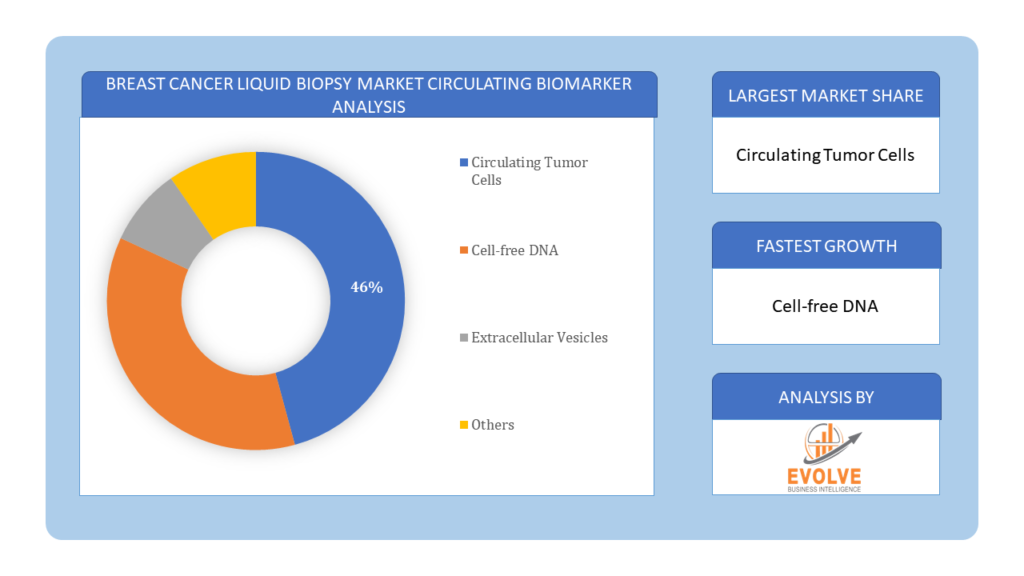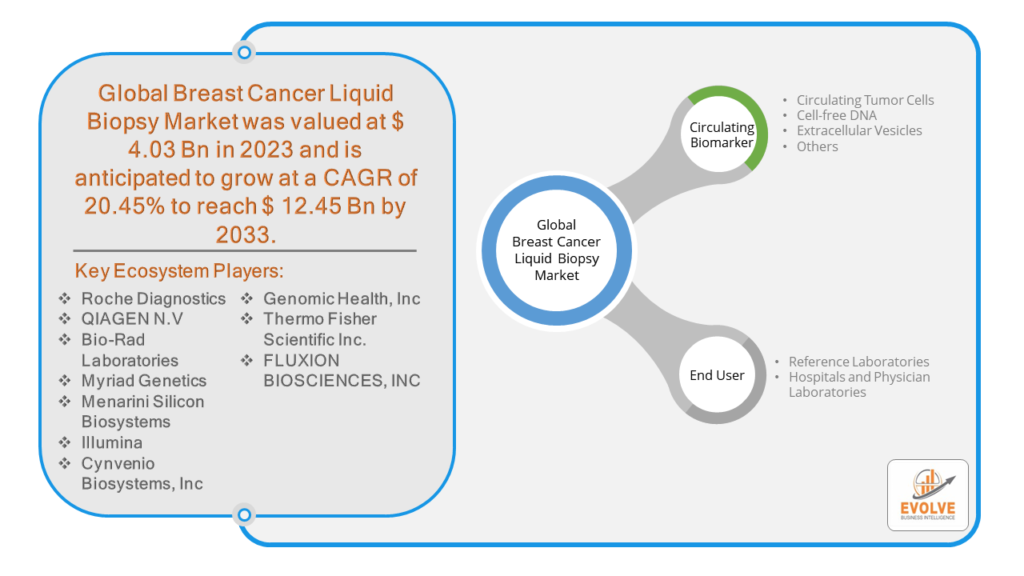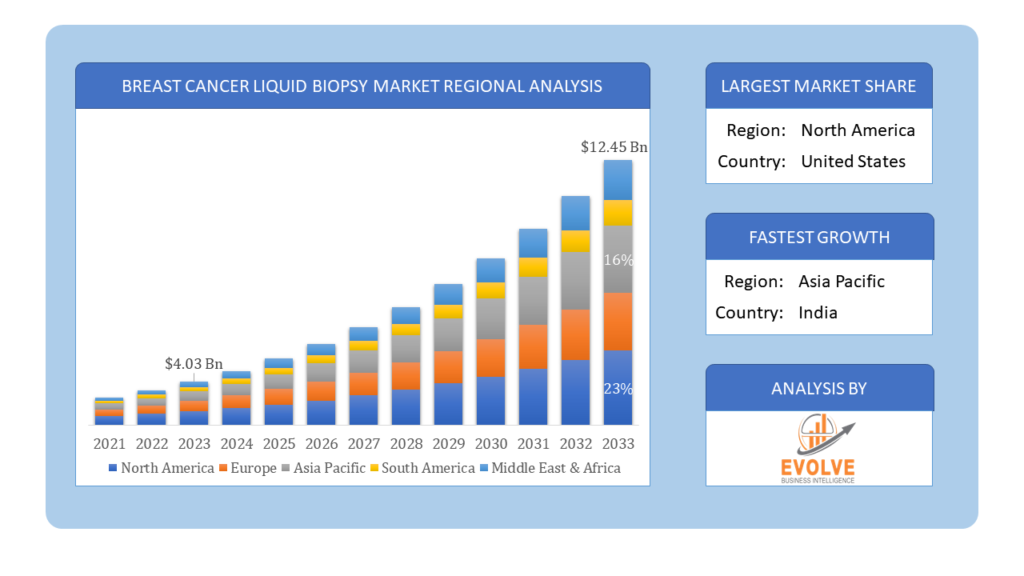Breast Cancer Liquid Biopsy Market Analysis and Global Forecast 2023-2033
$ 1,390.00 – $ 5,520.00Price range: $ 1,390.00 through $ 5,520.00
Breast Cancer Liquid Biopsy Market Research Report: Information Breast Cancer Liquid Biopsy Market By Circulating Biomarker (Circulating Tumor Cells, Cell-free DNA, Extracellular Vesicles, Others), By End User (Reference Laboratories, Hospitals and Physician Laboratories), and by Region — Forecast till 2033.
Page: 156
Breast Cancer Liquid Biopsy Market Overview
The Breast Cancer Liquid Biopsy Market Size is expected to reach USD 12.45 Billion by 2033. The Breast Cancer Liquid Biopsy industry size accounted for USD 4.03 Billion in 2023 and is expected to expand at a compound annual growth rate (CAGR) of 20.45% from 2023 to 2033. The breast cancer liquid biopsy market involves the development and utilization of non-invasive diagnostic tests to detect and monitor breast cancer using blood samples. These tests analyze circulating tumor cells (CTCs), cell-free DNA (cfDNA), and other biomarkers to provide insights into the presence and progression of the disease. Liquid biopsies offer advantages over traditional tissue biopsies, such as reduced risk, quicker results, and the ability to track treatment response and detect early recurrence. This market is driven by advancements in genomic technologies, increasing cancer prevalence, and the demand for personalized medicine.
Global Breast Cancer Liquid Biopsy Market Synopsis
The COVID-19 pandemic has led to supply chain disruptions leading to supply shortages or lower demand in the Breast Cancer Liquid Biopsy market. The travel restrictions and social-distancing measures have resulted in a sharp drop in consumer and business spending and this pattern is to continue for some time. The end-user trend and preferences have changed due to the pandemic and have resulted in manufacturers, developers, and service providers to adopt various strategies to stabilize the company.
Breast Cancer Liquid Biopsy Market Dynamics
The major factors that have impacted the growth of Breast Cancer Liquid Biopsy are as follows:
Drivers:
Ø Technological Advancements
Innovations in genomic and molecular technologies have significantly enhanced the accuracy and reliability of liquid biopsy tests. Techniques such as next-generation sequencing (NGS) and digital PCR enable detailed analysis of circulating tumor cells (CTCs) and cell-free DNA (cfDNA), leading to better detection and monitoring of breast cancer.
Restraint:
- High Costs and Reimbursement Issues
The initial development and implementation of liquid biopsy tests can be expensive. These high costs may limit their widespread adoption, particularly in low- and middle-income countries. Additionally, inconsistent reimbursement policies from insurance companies and healthcare systems can hinder patient access to these advanced diagnostic tools.
Opportunity:
⮚ Advancements in Technology and Methodologies
Ongoing advancements in genomic sequencing, digital PCR, and other molecular techniques are continually improving the sensitivity, specificity, and cost-effectiveness of liquid biopsy tests. These technological innovations can broaden the scope of liquid biopsies, making them more accessible and reliable for widespread clinical use.
Breast Cancer Liquid Biopsy Segment Overview
By Circulating Biomarker
 Based on Circulating Biomarker, the market is segmented based on Circulating Tumor Cells, Cell-free DNA, Extracellular Vesicles, Others. Based on circulating biomarkers, the breast cancer liquid biopsy market is segmented into circulating tumor cells (CTCs), cell-free DNA (cfDNA), extracellular vesicles, and others. Cell-free DNA (cfDNA) dominates this segment due to its higher sensitivity and specificity for detecting genetic mutations and tumor-associated alterations, making it a crucial tool for early detection and monitoring of breast cancer.
Based on Circulating Biomarker, the market is segmented based on Circulating Tumor Cells, Cell-free DNA, Extracellular Vesicles, Others. Based on circulating biomarkers, the breast cancer liquid biopsy market is segmented into circulating tumor cells (CTCs), cell-free DNA (cfDNA), extracellular vesicles, and others. Cell-free DNA (cfDNA) dominates this segment due to its higher sensitivity and specificity for detecting genetic mutations and tumor-associated alterations, making it a crucial tool for early detection and monitoring of breast cancer.
By End User
Based on End Users, the market has been divided into the Reference Laboratories, Hospitals and Physician Laboratories. Based on end users, the breast cancer liquid biopsy market is segmented into reference laboratories, hospitals, and physician laboratories. Among these, reference laboratories dominate the market due to their advanced technological capabilities, comprehensive testing services, and high-volume processing capacity, which ensures accurate and timely diagnostic results.
Global Breast Cancer Liquid Biopsy Market Regional Analysis
Based on region, the global Breast Cancer Liquid Biopsy market has been divided into North America, Europe, Asia-Pacific, the Middle East & Africa, and Latin America. North America is projected to dominate the use of the Breast Cancer Liquid Biopsy market followed by the Asia-Pacific and Europe regions.
 Breast Cancer Liquid Biopsy North America Market
Breast Cancer Liquid Biopsy North America Market
North America holds a dominant position in the Breast Cancer Liquid Biopsy Market. North America holds a significant share of the breast cancer liquid biopsy market, driven by advanced healthcare infrastructure, high adoption of innovative diagnostic technologies, and substantial investments in research and development. The region’s strong presence of key market players, coupled with supportive regulatory frameworks, further boosts market growth. Additionally, the high prevalence of breast cancer and increasing awareness about early detection and personalized medicine contribute to the demand for liquid biopsy tests in North America. The availability of funding and grants for cancer research also accelerates the development and commercialization of new liquid biopsy technologies.
Breast Cancer Liquid Biopsy Asia-Pacific Market
The Asia-Pacific region is experiencing rapid growth in the breast cancer liquid biopsy market due to increasing awareness about early cancer detection and the rising incidence of breast cancer. Improvements in healthcare infrastructure, coupled with growing investments in medical research and technological advancements, are driving market expansion. Countries like China, Japan, and India are witnessing significant adoption of liquid biopsy technologies, supported by government initiatives and funding for cancer diagnostics. Additionally, the region’s large population base and increasing healthcare expenditure provide substantial opportunities for market players to expand their presence and offer advanced diagnostic solutions.
Competitive Landscape
The global Breast Cancer Liquid Biopsy market is highly competitive, with numerous players offering a wide range of software solutions. The competitive landscape is characterized by the presence of established companies, as well as emerging startups and niche players. To increase their market position and attract a wide consumer base, the businesses are employing various strategies, such as product launches, and strategic alliances.
Prominent Players:
- Roche Diagnostics
- QIAGEN N.V
- Bio-Rad Laboratories
- Myriad Genetics
- Menarini Silicon Biosystems
- Illumina
- Cynvenio Biosystems, Inc
- Genomic Health, Inc
- Thermo Fisher Scientific Inc.
- FLUXION BIOSCIENCES, INC
Key Development
In September 2022, Bio-Rad Laboratories unveiled a groundbreaking advancement in breast cancer liquid biopsy with the introduction of their QX600 Droplet Digital PCR System, enhancing the precision and sensitivity of detecting circulating tumor DNA (ctDNA) for early diagnosis and treatment monitoring.
Scope of the Report
Global Breast Cancer Liquid Biopsy Market, by Circulating Biomarker
- Circulating Tumor Cells
- Cell-free DNA
- Extracellular Vesicles
- Others
Global Breast Cancer Liquid Biopsy Market, by End User
- Reference Laboratories
- Hospitals and Physician Laboratories
Global Breast Cancer Liquid Bviopsy Market, by Region
- North America
- US
- Canada
- Mexico
- Europe
- UK
- Germany
- France
- Italy
- Spain
- Benelux
- Nordic
- Rest of Europe
- Asia Pacific
- China
- Japan
- South Korea
- Indonesia
- Austalia
- Malaysia
- India
- Rest of Asia Pacific
- South America
- Brazil
- Argentina
- Rest of South America
- Middle East & Africa
- Saudi Arabia
- UAE
- Egypt
- South Africa
- Rest of Middle East & Africa
| Parameters | Indicators |
|---|---|
| Market Size | 2033: $12.45 Billion |
| CAGR | 20.45% CAGR (2023-2033) |
| Base year | 2022 |
| Forecast Period | 2023-2033 |
| Historical Data | 2021 |
| Report Coverage | Revenue Forecast, Competitive Landscape, Growth Factors, and Trends |
| Key Segmentations | Circulating Biomarker, End User |
| Geographies Covered | North America, Europe, Asia-Pacific, Latin America, Middle East, Africa |
| Key Vendors | Roche Diagnostics, QIAGEN N.V, Bio-Rad Laboratories, Myriad Genetics, Menarini Silicon Biosystems, Illumina, Cynvenio Biosystems, Inc, Genomic Health, Inc, Thermo Fisher Scientific Inc., FLUXION BIOSCIENCES, INC |
| Key Market Opportunities | • The rise of e-commerce |
| Key Market Drivers | • Technological Advancements • Increasing Urbanization |
REPORT CONTENT BRIEF:
- High-level analysis of the current and future Breast Cancer Liquid Biopsy market trends and opportunities
- Detailed analysis of current market drivers, restraining factors, and opportunities in the future
- Breast Cancer Liquid Biopsy market historical market size for the year 2021, and forecast from 2023 to 2033
- Breast Cancer Liquid Biopsy market share analysis at each product level
- Competitor analysis with detailed insight into its product segment, Government & Defense strength, and strategies adopted.
- Identifies key strategies adopted including product launches and developments, mergers and acquisitions, joint ventures, collaborations, and partnerships as well as funding taken and investment done, among others.
- To identify and understand the various factors involved in the global Breast Cancer Liquid Biopsy market affected by the pandemic
- To provide a detailed insight into the major companies operating in the market. The profiling will include the Government & Defense health of the company’s past 2-3 years with segmental and regional revenue breakup, product offering, recent developments, SWOT analysis, and key strategies.
Press Release

Global Pharmaceutical Manufacturing Market to Reach $1.38 Trillion by 2035 with 7.35% CAGR, New Research Shows

The Global Mammography Market Is Estimated To Record a CAGR of Around 10.29% During The Forecast Period

Glue Stick Market to Reach USD 2.35 Billion by 2034

Podiatry Service Market to Reach USD 11.88 Billion by 2034

Microfluidics Technology Market to Reach USD 32.58 Billion by 2034

Ferric Chloride Market to Reach USD 10.65 Billion by 2034

Family Practice EMR Software Market to Reach USD 21.52 Billion by 2034

Electric Hairbrush Market to Reach USD 15.95 Billion by 2034

Daily Bamboo Products Market to Reach USD 143.52 Billion by 2034

Cross-border E-commerce Logistics Market to Reach USD 112.65 Billion by 2034
Frequently Asked Questions (FAQ)
What is the study period of the Breast Cancer Liquid Biopsy Market?
The study period for the Breast Cancer Liquid Biopsy Market is from 2023 to 2033.
What is the growth rate of the Breast Cancer Liquid Biopsy Market?
The Breast Cancer Liquid Biopsy Market is expected to expand at a compound annual growth rate (CAGR) of 20.45% from 2023 to 2033.
Which region has the highest growth rate in the Breast Cancer Liquid Biopsy Market?
The Asia-Pacific region is experiencing the highest growth rate in the Breast Cancer Liquid Biopsy Market due to rising awareness and healthcare advancements.
Which region has the largest share of the Breast Cancer Liquid Biopsy Market?
North America holds the largest share of the Breast Cancer Liquid Biopsy Market, driven by advanced healthcare infrastructure and substantial investments in research.
Who are the key players in the Breast Cancer Liquid Biopsy Market?
Key players in the Breast Cancer Liquid Biopsy Market include Roche Diagnostics, QIAGEN N.V, Bio-Rad Laboratories, Myriad Genetics, Menarini Silicon Biosystems, Illumina, Cynvenio Biosystems, Inc, Genomic Health, Inc, Thermo Fisher Scientific Inc., and FLUXION BIOSCIENCES, INC.
Do you offer Post sales support?
Yes, we offer 16 hours of analyst support to solve the queries
Do you sell particular sections of a report?
Yes, we provide regional as well as country-level reports. Other than this we also provide a sectional report. Please get in contact with our sales representatives.
Table of Content
Chapter 1. Executive Summary
Chapter 2. Scope Of The Study
2.1. Market Definition
2.2. Scope Of The Study
2.2.1. Objectives of Report
2.2.2. Limitations
2.3. Market Structure
Chapter 3. Evolve BI Methodology
Chapter 4. Market Insights and Trends
4.1. Supply/ Value Chain Analysis
4.1.1. Raw End Users Providers
4.1.2. Manufacturing Process
4.1.3. Distributors/Retailers
4.1.4. End-Use Industry
4.2. Porter’s Five Forces Analysis
4.2.1. Threat Of New Entrants
4.2.2. Bargaining Power Of Buyers
4.2.3. Bargaining Power Of Suppliers
4.2.4. Threat Of Substitutes
4.2.5. Industry Rivalry
4.3. Impact Of COVID-19 on the Breast Cancer Liquid Biopsy Market
4.3.1. Impact on Market Size
4.3.2. End-Use Industry Trend, Preferences, and Budget Impact
4.3.3. Regulatory Framework/Government Policies
4.3.4. Key Players' Strategy to Tackle Negative Impact
4.3.5. Opportunity Window
4.4. Technology Overview
12.28. Macro factor
4.6. Micro Factor
4.7. Demand Supply Gap Analysis of the Breast Cancer Liquid Biopsy Market
4.8. Import Analysis of the Breast Cancer Liquid Biopsy Market
4.9. Export Analysis of the Breast Cancer Liquid Biopsy Market
Chapter 5. Market Dynamics
5.1. Introduction
5.2. DROC Analysis
5.2.1. Drivers
5.2.2. Restraints
5.2.3. Opportunities
5.2.4. Challenges
5.3. Patent Analysis
5.4. Industry Roadmap
5.5. Parent/Peer Market Analysis
Chapter 6. Global Breast Cancer Liquid Biopsy Market, By Circulating Biomarker
6.1. Introduction
6.2. Circulating Tumor Cells
6.3. Cell-free DNA
6.4. Extracellular Vesicles
6.5. Others
Chapter 7. Global Breast Cancer Liquid Biopsy Market, By End User
7.1. Introduction
7.2. Reference Laboratories
7.3. Hospitals and Physician Laboratories
Chapter 8. Global Breast Cancer Liquid Biopsy Market, By Region
8.1. Introduction
8.2. North America
8.2.1. Introduction
8.2.2. Driving Factors, Opportunity Analyzed, and Key Trends
8.2.3. Market Size and Forecast, By Country, 2023-2033
8.2.4. Market Size and Forecast, By Circulating Biomarker, 2023-2033
8.2.5. Market Size and Forecast, By End User, 2023-2033
8.2.6. US
8.2.6.1. Introduction
8.2.6.2. Driving Factors, Opportunity Analyzed, and Key Trends
8.2.6.3. Market Size and Forecast, By Circulating Biomarker, 2023-2033
8.2.6.4. Market Size and Forecast, By End User, 2023-2033
8.2.7. Canada
8.2.7.1. Introduction
8.2.7.2. Driving Factors, Opportunity Analyzed, and Key Trends
8.2.7.4. Market Size and Forecast, By Circulating Biomarker, 2023-2033
8.2.7.5. Market Size and Forecast, By End User, 2023-2033
8.3. Europe
8.3.1. Introduction
8.3.2. Driving Factors, Opportunity Analyzed, and Key Trends
8.3.3. Market Size and Forecast, By Country, 2023-2033
8.3.4. Market Size and Forecast, By Circulating Biomarker, 2023-2033
8.3.5. Market Size and Forecast, By End User, 2023-2033
8.3.6. Germany
8.3.6.1. Introduction
8.3.6.2. Driving Factors, Opportunity Analyzed, and Key Trends
8.3.6.3. Market Size and Forecast, By Circulating Biomarker, 2023-2033
8.3.6.4. Market Size and Forecast, By End User, 2023-2033
8.3.7. France
8.3.7.1. Introduction
8.3.7.2. Driving Factors, Opportunity Analyzed, and Key Trends
8.3.7.3. Market Size and Forecast, By Circulating Biomarker, 2023-2033
8.3.7.4. Market Size and Forecast, By End User, 2023-2033
8.3.8. UK
8.3.8.1. Introduction
8.3.8.2. Driving Factors, Opportunity Analyzed, and Key Trends
8.3.8.3. Market Size and Forecast, By Circulating Biomarker, 2023-2033
8.3.8.4. Market Size and Forecast, By End User, 2023-2033
8.3.9. Italy
8.3.9.1. Introduction
8.3.9.2. Driving Factors, Opportunity Analyzed, and Key Trends
8.3.9.3. Market Size and Forecast, By Circulating Biomarker, 2023-2033
8.3.9.4. Market Size and Forecast, By End User, 2023-2033
8.3.11. Rest Of Europe
8.3.11.1. Introduction
8.3.11.2. Driving Factors, Opportunity Analyzed, and Key Trends
8.3.11.3. Market Size and Forecast, By Circulating Biomarker, 2023-2033
8.3.11.4. Market Size and Forecast, By End User, 2023-2033
8.4. Asia-Pacific
8.4.1. Introduction
8.4.2. Driving Factors, Opportunity Analyzed, and Key Trends
8.4.3. Market Size and Forecast, By Country, 2023-2033
8.4.4. Market Size and Forecast, By Circulating Biomarker, 2023-2033
8.12.28. Market Size and Forecast, By End User, 2023-2033
8.4.6. China
8.4.6.1. Introduction
8.4.6.2. Driving Factors, Opportunity Analyzed, and Key Trends
8.4.6.3. Market Size and Forecast, By Circulating Biomarker, 2023-2033
8.4.6.4. Market Size and Forecast, By End User, 2023-2033
8.4.7. India
8.4.7.1. Introduction
8.4.7.2. Driving Factors, Opportunity Analyzed, and Key Trends
8.4.7.3. Market Size and Forecast, By Circulating Biomarker, 2023-2033
8.4.7.4. Market Size and Forecast, By End User, 2023-2033
8.4.8. Japan
8.4.8.1. Introduction
8.4.8.2. Driving Factors, Opportunity Analyzed, and Key Trends
8.4.8.3. Market Size and Forecast, By Circulating Biomarker, 2023-2033
8.4.8.4. Market Size and Forecast, By End User, 2023-2033
8.4.9. South Korea
8.4.9.1. Introduction
8.4.9.2. Driving Factors, Opportunity Analyzed, and Key Trends
8.4.9.3. Market Size and Forecast, By Circulating Biomarker, 2023-2033
8.4.9.4. Market Size and Forecast, By End User, 2023-2033
8.4.10. Rest Of Asia-Pacific
8.4.10.1. Introduction
8.4.10.2. Driving Factors, Opportunity Analyzed, and Key Trends
8.4.10.3. Market Size and Forecast, By Circulating Biomarker, 2023-2033
8.4.10.4. Market Size and Forecast, By End User, 2023-2033
8.5. Rest Of The World (RoW)
8.5.1. Introduction
8.5.2. Driving Factors, Opportunity Analyzed, and Key Trends
8.5.3. Market Size and Forecast, By Circulating Biomarker, 2023-2033
8.5.4. Market Size and Forecast, By End User, 2023-2033
Chapter 9. Company Landscape
9.1. Introduction
9.2. Vendor Share Analysis
9.3. Key Development Analysis
9.4. Competitor Dashboard
Chapter 10. Company Profiles
10.1. Roche Diagnostics
10.1.1. Business Overview
10.1.2. Government & Defense Analysis
10.1.2.1. Government & Defense – Existing/Funding
10.1.3. Product Portfolio
10.1.4. Recent Development and Strategies Adopted
10.1.5. SWOT Analysis
10.2. QIAGEN N.V
10.2.1. Business Overview
10.2.2. Government & Defense Analysis
10.2.2.1. Government & Defense – Existing/Funding
10.2.3. Product Portfolio
10.2.4. Recent Development and Strategies Adopted
10.2.5. SWOT Analysis
10.3. Bio-Rad Laboratories
10.3.1. Business Overview
10.3.2. Government & Defense Analysis
10.3.2.1. Government & Defense – Existing/Funding
10.3.3. Product Portfolio
10.3.4. Recent Development and Strategies Adopted
10.3.5. SWOT Analysis
10.4. Myriad Genetics
10.4.1. Business Overview
10.4.2. Government & Defense Analysis
10.4.2.1. Government & Defense – Existing/Funding
10.4.3. Product Portfolio
10.4.4. Recent Development and Strategies Adopted
10.12.28. SWOT Analysis
10.5. Menarini Silicon Biosystems
10.5.1. Business Overview
10.5.2. Government & Defense Analysis
10.5.2.1. Government & Defense – Existing/Funding
10.5.3. Product Portfolio
10.5.4. Recent Development and Strategies Adopted
10.5.5. SWOT Analysis
10.6. Illumina
10.6.1. Business Overview
10.6.2. Government & Defense Analysis
10.6.2.1. Government & Defense – Existing/Funding
10.6.3. Product Portfolio
10.6.4. Recent Development and Strategies Adopted
10.6.5. SWOT Analysis
10.7. Cynvenio Biosystems, Inc
10.7.1. Business Overview
10.7.2. Government & Defense Analysis
10.7.2.1. Government & Defense – Existing/Funding
10.7.3. Product Portfolio
10.7.4. Recent Development and Strategies Adopted
10.7.5. SWOT Analysis
10.8 Genomic Health, Inc
10.8.1. Business Overview
10.8.2. Government & Defense Analysis
10.8.2.1. Government & Defense – Existing/Funding
10.8.3. Product Portfolio
10.8.4. Recent Development and Strategies Adopted
10.8.5. SWOT Analysis
10.9 Thermo Fisher Scientific Inc.
10.9.1. Business Overview
10.9.2. Government & Defense Analysis
10.9.2.1. Government & Defense – Existing/Funding
10.9.3. Product Portfolio
10.9.4. Recent Development and Strategies Adopted
10.9.5. SWOT Analysis
10.10. FLUXION BIOSCIENCES, INC
10.10.1. Business Overview
10.10.2. Government & Defense Analysis
10.10.2.1. Government & Defense – Existing/Funding
10.10.3. Product Portfolio
10.10.4. Recent Development and Strategies Adopted
10.10.5. SWOT Analysis
Connect to Analyst
Research Methodology








